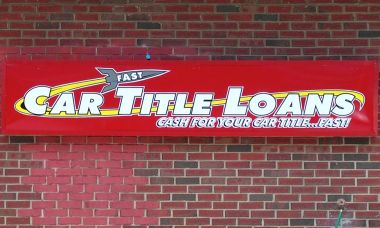Introduction
When Mildred Morris’s son won a coveted spot at the New York drama and performing arts college that trained singer-songwriter Jason Mraz and TV actor Jessie Tyler Ferguson of “Modern Family,” she was overjoyed. The drama, however, extended beyond school.
Morris started the process of securing a college loan to pay tuition for her son, Jonathan, to attend the American Musical and Dramatic Academy, but she was caught off guard by an unexpected and sudden $700 fee to hold a dormitory room for him.
A single mother of two in the town of Martinsburg, W.Va., 90 minutes northwest of Washington, D.C., Morris works in the technical support branch for the Coast Guard office that issues merchant seamen the equivalent of a driver’s license. Although she had a steady federal job, Morris didn’t have any savings or credit cards, and with the tough economy couldn’t scrape together the $700 fee from friends.
She did, however, own a sporty, green 2002 Pontiac Sunfire free and clear.

Amy Biegelsen/iWatch News
A friend told her about a place that gave quick cash if borrowers put up their cars as collateral. Obtaining the loan took just 30 minutes, she said, mostly to check her references. Morris signed a contract with Fast Auto Loans, took her check for $700 and gave the company the title to her car, which Fast Auto Loans could repossess if she fell behind in repayments.
It wasn’t until later that she realized how high the interest rate on her loan was — 300 percent annually.
“I should have taken time to go over it,” she acknowledged. “When I saw how large it was, and I was like, wow,” she said. At first she tried to pay more than the monthly minimum, but with the cost of getting Jonathan moved and settled in New York, she started to fall behind in payments to Fast Auto Loans. Some months she could only pay $210 and $175 of that went to interest, barely lowering the loan principal.
Many months and over $1,000 later, Morris called it quits, according to a complaint she filed with the West Virginia attorney general. The office is now investigating Fast Auto on behalf of Morris and other consumers .
When Morris fell behind on her payments, Fast Auto Loans employees began calling the references she had listed on the loan paperwork. “On the day the payment was due they would start calling people. It was ridiculous,” she said. Her sister, her adult daughter, her friends — even her supervisor at work — got repeated calls from Fast Auto Loans.
Frustrated, Morris finally gave up and told the company it could take the car, according to a statement she filed with the West Virginia attorney general. One night, two men from Fast Auto Loans drove up to her townhouse on the edge of town. One hopped out and drove the car away. “I felt sick,” Morris said. Kelley Blue Book estimates a car of the same make and model from that year would be worth at least $2,000.
“I ended up losing my car over $700,” she said. “I didn’t want to let my car go, but I didn’t have a choice.”
Consumer protection advocates have long raised concerns about this kind of credit.
Car-title loans, which are now regulated differently in each U.S. state, are on the list of priorities of the new Consumer Financial Protection Bureau (CFPB), which officially opens for business on July 21. Policing non-bank financial services “will be a crucial piece” of the bureau’s business, Elizabeth Warren, who has been in charge of setting up the agency so far, told reporters at a June briefing. .
However, the bureau is expressly prohibited from setting limits on interest rates. And the still-leaderless CFPB cannot propose any new regulations until the U.S. Senate confirms a presidential nominee as director. Senate Republicans have threatened to block any nominee until the CFPB is restructured to weaken its power.
An important first step, said Ira Rheingold of the National Association of Consumer Advocates, is for the CFPB to use its research capacity to gather facts and data about car-title lending. “After they determine whether or not there’s a social utility to this, or whether this is simply a predatory product, they then can craft rules and rulemaking based on that,” he said.
Morris is all for it.
“I know there’s a lot of single moms out there and how hard the economy is,” Morris said, “but those people are not there for you; they’re there to rip you off.”
Fast Auto Loans’ parent company, Atlanta-based Community Loans of America, Inc. declined to comment, saying it has a policy of not issuing speaking to the press. An attorney representing Fast Auto Loans in West Virginia did not respond to requests for comment.
Defenders of car-title loans say they help people who have no other options. Title lenders advertise themselves as providers of fast, easy cash even for consumers with bad credit. “The whole process from application to receiving the funds will take about 15 minutes,” according to the website for Cashpoint, a large title lender in Virginia, whose number is 1-888-EZ-BUCKS.
The American Association of Responsible Auto Lenders, an industry group, says most car-title loans are paid back in six months or less. Member companies “keep consumers’ payments low enough so they are able to successfully pay off the loan and get their title back,” the group says on its website.
A key feature of the title-loan business is that it does not require borrowers to have bank accounts. That distinguishes the industry from payday lenders, another short-term, high-interest credit option that either requires the borrower to write a post-dated check or to provide electronic access to a bank account for automatic repayments.
Title loans typically are made for one month at a 300 percent annual rate. That means a borrower who needs $500 must pay $625 by the end of the month. If the borrower can only afford to cover the interest — $125 — the loan is rolled over for another month and the borrower will owe another $625.
A glimpse inside title industry
It is difficult to get a clear picture of the title-loan industry and how big it is. Only 20 states allow auto-title lending, and regulation is scattered throughout different parts of each state’s government.
The American Association of Responsible Auto Lenders, which did not respond to iWatch News requests for comment, does not publish industry statistics on its website. It describes the average borrower as 44 years old with a household income over $50,000 and an “overwhelming majority have jobs.”
However, a few state regulatory reports give a glimpse inside the industry
- In Illinois in 2010, the average auto-title borrower earned about $24,000 a year, according to data through November from that state’s Department of Financial and Professional Regulation. The average title loan was for $797 and took consumers over 300 days to repay plus an average additional $1,542 in fees and interest.
- Tennessee found similar results. At the end of 2006, nearly 90 percent of outstanding auto-title loans in the state had been renewed beyond the first month, according to a report from the Tennessee Department of Financial Institutions. And 14 percent of the borrowers had renewed their loans 10 times or more. Car-title lenders who used the state’s maximum allowable annual rate of 264 percent made a 20 percent average profit margin, but would have needed to charge 211 percent to break even, the report said.
- In Virginia, title companies repossessed 22,394 vehicles from 2004 to 2009, according to data that emerged during a state legislature debate on car-title lending. In 2008 and 2009, title loan repossessions accounted for more than 90 percent of all car repossessions in the state.
As costly to consumers as the lenders’ practices may be, “the lack of financial literacy among some citizens is a serious concern,” the Tennessee report concluded, “and we believe it is often a root problem for some of the ills we see in the financial services sector.”
Dana Wiggins operates the consumer help hotline for the Virginia Poverty Law Center and hears first-hand about the problems of some title-loan borrowers. “When they lost their car, they lost their job,” she said. “That’s their lifeline to get health care, to get their kids to school. It was really painful to hear that that’s the only remedy for the loan.”
Auto-title industry defenders say a tough choice is better than no choice.
Todd Zywicki, a law professor at George Mason University, has researched the business and says the loans play an important role. Since many title-loan borrowers have no bank account, their range of options is dramatically narrowed.
“Maybe taking people with limited choices and taking away some of those choices make them better off,” he said, “but I find that hard to believe.” Zywicki acknowledges that people can get in over their heads with title loans, but argues “people can borrow too much on a 30-year fixed-rate mortgage.”
Uriah King, vice president of state policy at the Center for Responsible Lending, sees car-title loans as no choice at all. “The entire business model is loans that are made without the ability to pay,” he said.
A borrower can easily get trapped in a cycle of debt if he or she falls behind in repayments, loses the car, and can no longer get to work, King said. A 2007 study by his organization of title-loan borrowers in Chicago found one-fifth of the loans were used to repay a previous loan with the same lender, he said.
The U.S. Congress has also been wary of the high-interest loans, and in 2006, passed a law that capped the interest rate at 30 percent for title loans to active-duty members of the armed services.
The car-title industry has stepped up its federal lobbying in recent years. According to disclosures filed with the U.S. Senate, the American Association of Responsible Auto Lenders has spent more than $1 million to hire the powerful lobby shop Patton Boggs since 2008 to lobby on consumer credit issues and the powers of the CFPB.
Interstate loans
Because title-loans are regulated at the state level, the tangle of competing state rules is something advocates hope the new federal Consumer Financial Protection Bureau (CFPB) can tame.
When Morris wanted to obtain one on her Pontiac Sunfire to pay for her son’s dorm reservation, she had to drive 40 minutes east over the state line to Winchester, Va. Auto-title loans are prohibited in West Virginia, but along Valley Drive in Winchester three different title lenders dot the mix of fast food joints and strip malls. Fast Auto Loans’ sign features a cartoon rocket ship logo, blasting off for fast cash.
West Virginia’s usury laws ban similar loans with interest rates higher than 18 percent. While the state cannot block citizens from getting the loans in neighboring states, the state can regulate the debt collection process. West Virginia’s attorney general is investigating Fast Auto Loans on behalf of Morris and others.
West Virginia argues that Fast Auto’s repossession of Morris’ car shows that the company was doing business inside the state, and that its persistent debt collection calls violate the West Virginia Consumer Credit and Protection Act.
Fast Auto Loans, meanwhile, has flatly denied that it does business in West Virginia.
The company’s attorney, David Barnette, did not respond to iWatch News requests for comment, but in a court filing, he asserted that “Fast Auto is not registered to transact business in West Virginia and does not transact business in West Virginia.”
The state attorney general’s office is trying to persuade a West Virginia judge to enforce a subpoena to obtain company documents even though the business is in another state, a move Fast Auto’s lawyer calls a “severe and unjustified intrusion of [his clients’] rights.”
National standards and regulation of the auto-title industry are long overdue to save states the time and money needed to fight the same issues over and over, according to consumer advocates.
Wisconsin’s attorney general, for example, recently joined a 10-year-old lawsuit filed by the Legal Aid Society of Milwaukee against Fast Auto Loans’ parent company over a hidden-fees issue that the parent company had previously settled with Florida.
As with many other non-bank lending operations, before the Wall Street reform law created the Consumer Financial Protection Bureau, there was no central regulator for title lending.
The practice itself is a by-product of a 1978 U.S. Supreme Court decision, says King. Before then, most states imposed “usury caps” on how much interest a lender could charge. But the high court ruled that a bank in one state making a loan to a borrower in another state could offer whatever interest rate was allowed in the lender’s home state. Many states then lifted their usury caps to attract credit card companies, and title lending bloomed as an unintended consequence.
Jean Ann Fox, director of financial services for the Consumer Federation of America, says that other factors contributed to the growth of the industry, including effective lobbying from the industry to remain exempt from regulations that might squash it.
Fox says car-title loans are particularly problematic because a borrower is deemed fit for a loan based on the value of their car, not their ability to repay the loan.
“That’s a recipe for getting caught in a debt trap and not getting out,” she said.
She’d like to see the new consumer bureau require title lenders to take into account a borrower’s ability to repay and outline a responsible small-dollar loan framework, similar to the one the Federal Deposit Insurance Corp. has put forward in a pilot program. The FDIC program recommends bankers adopt a 90-day loan limit and cap small loans at 36 percent annual interest.
The Center for Responsible Lending’s King hopes to see the CFPB set limits on how often car-title loans can be renewed. They’re meant to be short-term loans, but customers often end up rolling them over for months, paying the interest and fees and barely making a dent in the principal.
Although Wisconsin recently reopened the door for the industry, King says there’s “not a lot of appetite” in states that currently prohibit the practice to let title loans grow.
“They’re trying to find ways to export,” their business to neighboring states that don’t allow title lending, he says.
Although West Virginia, Washington D.C., Maryland and North Carolina don’t allow title lending, Virginia enacted a law effective July 1 that specifically allows title-lenders there to offer loans on cars registered in other states.
“A family may be driving from Maine to Florida to go to Disneyland and if they break down in Richmond, they may not [have been] able to get a loan,” said Scott Daniel, who lobbied for Fast Auto Loans’ parent company, Community Loans of America, to help extend the reach of Virginia’s title lenders. Now, “they’ll be able to get a loan.”
Growing the business in Virginia has meant growing business for lobbyists, too. According to the Virginia Public Access Project, a nonprofit that collects Virginia’s campaign finance and lobbying records, three major title lenders spent more than $270,000 from 2008 to 2010 on lobbying around title loan issues.
Back in West Virginia, Jonathan is at home with his mom for the summer.
Losing the Sunfire was a blow, but Morris also had a truck — a red 2005 Ford pickup — that she used to get to work during the year. Without a second vehicle, though, it’s been tough for Jonathan to find work this summer to help his mom defray the costs of performing arts college in New York. It’s also been a challenge for him to get to dance classes so he can stay in shape for school in the fall. He’s still looking for work.
“Losing the car really hurt us, but we have the truck so we’ll get by,” Morris said. “Not everyone will.”







Join the conversation
Show Comments